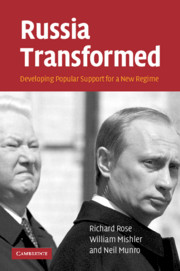Book contents
- Frontmatter
- Contents
- List of figures
- List of tables
- Acknowledgments
- Introduction Transformation and its aftermath
- 1 Time matters: the dynamics of regime support
- 2 The supply of regimes: democratic and autocratic
- 3 A changing supply of Russian regimes
- 4 Uncertainties of transformation: a view from the bottom
- 5 Changing levels of regime support
- 6 Social structure and the evaluation of regimes
- 7 The influence of political values and performance
- 8 Finding the economic influences that matter
- 9 The impact of the passage of time
- 10 What could challenge the new equilibrium?
- Appendix A New Russia Barometer samples
- Appendix B Coding of variables
- References
- Index
4 - Uncertainties of transformation: a view from the bottom
Published online by Cambridge University Press: 22 September 2009
- Frontmatter
- Contents
- List of figures
- List of tables
- Acknowledgments
- Introduction Transformation and its aftermath
- 1 Time matters: the dynamics of regime support
- 2 The supply of regimes: democratic and autocratic
- 3 A changing supply of Russian regimes
- 4 Uncertainties of transformation: a view from the bottom
- 5 Changing levels of regime support
- 6 Social structure and the evaluation of regimes
- 7 The influence of political values and performance
- 8 Finding the economic influences that matter
- 9 The impact of the passage of time
- 10 What could challenge the new equilibrium?
- Appendix A New Russia Barometer samples
- Appendix B Coding of variables
- References
- Index
Summary
I survived.
Abbé Sieyès, when asked what he did during the French RevolutionRegimes are assessed from the top down by constitutional lawyers, by journalists, and by ambitious political elites. In the Soviet era the topdown approach to politics was of overwhelming importance. In the new regime, attention continues to be concentrated on the world of politics within the koltsevaya doroga, the ring road of Moscow. The Kremlin puts pressure on the media to spin stories to its liking. Television programmers want pictures showing the president in motion or of a celebrity commentator against a Moscow backdrop. Print journalists can report a wider view of life, but favor what is immediate and what is exceptional rather than the “ordinariness” of everyday life.
However, it is politically as well as methodologically misleading to infer mass opinion from the statements of political elites. Even though in international law the government may legitimately claim to speak for the whole population, every election shows that the electorate is divided. Social science offers a way to capture differences of opinion through a sample survey representative of the population nationwide. A carefully designed questionnaire can capture political attitudes toward transformation and relate them to differences in the social and economic circumstances of respondents. If questions are repeated in a number of surveys over the years, this will differentiate between firmly held values that change little in response to events, and opinions that show a trend or fluctuate over time.
- Type
- Chapter
- Information
- Russia TransformedDeveloping Popular Support for a New Regime, pp. 69 - 85Publisher: Cambridge University PressPrint publication year: 2006



